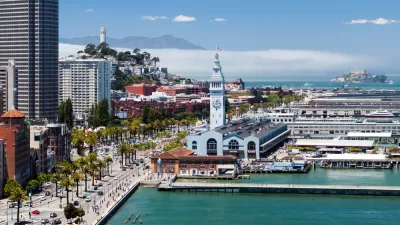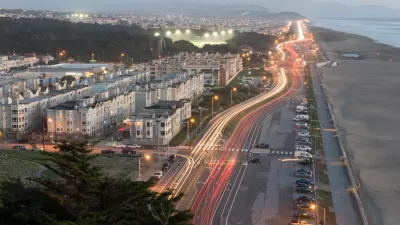As climate change accelerates coastal erosion across the continent, officials everywhere look to San Francisco to see how it will stem the tide, Felicity Barringer reports.
On San Francisco's 3.5-mile-long Ocean Beach, the very same waves that beckon tourists and surfers to the West Coast are slowly chipping the shore away. While erosion "is a perennial issue for beachfront communities," Ocean Beach is especially sensitive: unabated, the encroaching waves threaten to destroy critical infrastructure, including the Great Highway, a wastewater treatment plant, and a 14-foot-wide stormdrain pipe.
It may take some time, but the consequences are expected to be severe, and worsened by rising sea levels due to climate change. "Researchers warned in two new studies that severe coastal flooding could occur regularly in the United States by the middle of the century and that California would be among the states most affected," Barringer notes.
For officials in San Francisco, the options are limited: either reinforce the beach with walls and riprap, build it back up with more sand, or retreat altogether. Stakeholders are divided over these solutions, with each costing on the order of tens of millions of dollars. But a study by the San Francisco Planning and Urban Research Association "projects that sea-level rise there could impose costs of more than $650 million by 2100 if nothing is done."
Barringer summarizes a report by economists at San Francisco State University, writing that "Communities can either plan for the long term or improvise, storm by storm, until ad hoc solutions are inadequate."
FULL STORY: Both Coasts Watch Closely as San Francisco Faces Erosion

Maui's Vacation Rental Debate Turns Ugly
Verbal attacks, misinformation campaigns and fistfights plague a high-stakes debate to convert thousands of vacation rentals into long-term housing.

Planetizen Federal Action Tracker
A weekly monitor of how Trump’s orders and actions are impacting planners and planning in America.

San Francisco Suspends Traffic Calming Amidst Record Deaths
Citing “a challenging fiscal landscape,” the city will cease the program on the heels of 42 traffic deaths, including 24 pedestrians.

Defunct Pittsburgh Power Plant to Become Residential Tower
A decommissioned steam heat plant will be redeveloped into almost 100 affordable housing units.

Trump Prompts Restructuring of Transportation Research Board in “Unprecedented Overreach”
The TRB has eliminated more than half of its committees including those focused on climate, equity, and cities.

Amtrak Rolls Out New Orleans to Alabama “Mardi Gras” Train
The new service will operate morning and evening departures between Mobile and New Orleans.
Urban Design for Planners 1: Software Tools
This six-course series explores essential urban design concepts using open source software and equips planners with the tools they need to participate fully in the urban design process.
Planning for Universal Design
Learn the tools for implementing Universal Design in planning regulations.
Heyer Gruel & Associates PA
JM Goldson LLC
Custer County Colorado
City of Camden Redevelopment Agency
City of Astoria
Transportation Research & Education Center (TREC) at Portland State University
Jefferson Parish Government
Camden Redevelopment Agency
City of Claremont




























